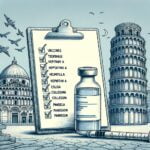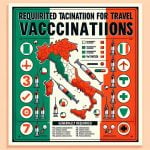Do you have to get shots to travel to Italy? Italy is a popular tourist destination known for its rich history, stunning architecture, and delicious cuisine. However, before packing your bags and booking your flight, it’s important to consider the health and safety aspect of your trip. This article will provide valuable information on the required vaccinations, recommended immunizations, understanding Italy’s health and medical system, as well as tips for staying healthy while traveling in Italy.
When traveling to a new country, it’s essential to be aware of any potential health risks and necessary precautions. Understanding the health and safety aspects of Italy can help ensure a smooth and enjoyable trip. Whether you’re planning a leisurely vacation or an adventurous exploration of Italy’s many attractions, being informed about healthcare and medical services in the country is crucial for a worry-free travel experience.
In this article, we will explore the required vaccinations for travel to Italy, recommended immunizations, access to healthcare and emergency services in Italy, as well as practical tips for staying healthy during your visit. By arming yourself with knowledge about these important factors, you can make informed decisions for a healthy trip to Italy. Let’s dive into what travelers need to know before embarking on their Italian adventure.
Health and Safety in Italy
Italy is known for its rich history, beautiful landscapes, and delicious cuisine. However, like any destination, it is important for travelers to be aware of potential health risks when visiting the country. From food and water safety to common illnesses and diseases, understanding the health and safety concerns in Italy is crucial for a successful and enjoyable trip.
Food and Water Safety
One of the most common health risks for travelers in Italy is related to food and water safety. While tap water is generally safe to drink in most parts of the country, it’s always best to stick to bottled or filtered water to avoid any potential stomach upset. When dining out, make sure that the food you are consuming is cooked thoroughly and served hot to minimize the risk of foodborne illnesses.
Vector-Borne Diseases
Another health risk that travelers should be aware of in Italy is the presence of vector-borne diseases such as Lyme disease and West Nile virus. These diseases are typically spread through insect bites, so it’s important to take precautions such as using insect repellent, wearing long sleeves and pants, and avoiding outdoor activities during peak mosquito activity times.
Air Pollution
In some areas of Italy, particularly major cities like Rome and Milan, air pollution can be a concern. Travelers with respiratory conditions should be mindful of air quality alerts and take necessary precautions such as carrying inhalers or other medications as needed. Additionally, using public transportation or walking instead of driving can help minimize exposure to air pollution during your visit.
Overall, being informed about these health risks in Italy can help travelers take proactive measures to protect themselves and enjoy a safe and healthy trip.
Required Vaccinations for Travel to Italy
Italy is a popular destination for travelers, known for its rich history, beautiful landscapes, and delicious cuisine. When planning a trip to Italy, it’s important to be aware of any required vaccinations to ensure a safe and healthy travel experience. So, do you have to get shots to travel to Italy? The answer depends on your individual health status and the specific areas you plan to visit within the country.
As of now, there are no required vaccinations for travelers entering Italy. However, it’s important to stay updated on the latest recommendations from the Centers for Disease Control and Prevention (CDC) and consult with a healthcare professional before your trip. Some vaccines may be recommended based on your personal health history, the duration of your stay in Italy, and any activities you plan to engage in while there.
The most common vaccine that may be recommended for travelers to Italy is the routine immunizations that protect against diseases such as measles, mumps, rubella, diphtheria, pertussis, tetanus, polio, and influenza. Additionally, hepatitis A and B vaccines may be suggested depending on your risk factors and planned activities.
It’s essential to schedule a pre-travel consultation with a healthcare provider at least 4-6 weeks before your trip to ensure that you have enough time to complete any necessary vaccinations or booster shots.
Recommended Vaccinations and Immunizations
When traveling to Italy, it is important to be aware of the recommended vaccinations and immunizations to ensure a healthy trip. While there are no specific vaccinations required for entry into Italy, there are certain vaccines that are recommended for travelers to protect against common diseases. Here are some of the recommended vaccinations and immunizations for travel to Italy:
- Hepatitis A: This vaccine is recommended for all travelers to Italy, as the risk of hepatitis A can be present in contaminated food or water.
- Tetanus: Ensuring that your tetanus vaccine is up to date is important, especially if you plan on participating in outdoor activities or walking in rural areas where there may be an increased risk of injury.
- Influenza: Getting a flu shot before traveling can help protect against seasonal influenza, which can occur at any time of year in Italy.
In addition to these recommended vaccinations, it is important for travelers to ensure that their routine vaccines such as measles-mumps-rubella (MMR), varicella (chickenpox), polio, and the annual flu shot are up to date before traveling to Italy. It is also advisable to consult with a healthcare provider or travel medicine specialist at least 4-6 weeks before your trip to discuss any additional vaccines or health precautions based on your individual medical history and travel plans.
Overall, while there are no mandatory vaccinations required for travel to Italy, staying up-to-date on routine vaccines and considering additional recommended vaccinations can help protect against potential health risks while abroad. Understanding the specific health recommendations for traveling to Italy will allow you to make informed decisions and better enjoy your trip without compromising your well-being.
Understanding Italy’s Health and Medical System
When traveling to Italy, it is essential to understand the country’s health and medical system in order to ensure a safe and healthy trip. Italy has a universal healthcare system that provides medical care to all citizens and residents, as well as visitors from other European Union countries. Understanding how the healthcare system works in Italy can help travelers navigate any potential health issues that may arise during their trip.
Here are some key points to know about Italy’s health and medical system:
- The Servizio Sanitario Nazionale (SSN) is Italy’s public healthcare system, which provides free or low-cost medical care to individuals who are registered with the National Health Service. This includes emergency services, hospital care, specialist consultations, and prescription medications.
- In order to access healthcare services in Italy, travelers from outside the European Union should have travel insurance that covers medical treatment while abroad. It is also recommended to carry a European Health Insurance Card (EHIC) if you are a citizen of an EU member state.
- Private healthcare facilities are also available in Italy, offering a higher standard of care for those who prefer it or do not qualify for treatment under the SSN. However, these services can be more expensive for visitors without insurance coverage.
It is important for travelers to familiarize themselves with Italy’s health and medical system before their journey, in order to be prepared for any unexpected health issues that may arise during their trip. By understanding the options available for accessing healthcare in Italy, travelers can make informed decisions about their own well-being while abroad.
Tips for Staying Healthy While Traveling in Italy
When traveling to Italy, it is important to take necessary precautions to stay healthy and avoid common travel-related illnesses. Whether you are exploring the historic sites of Rome, indulging in the cuisine of Tuscany, or relaxing along the Amalfi Coast, here are some tips for staying healthy during your trip to Italy.
Stay Hydrated and Eat Well
One of the best ways to maintain good health while traveling is to stay hydrated and eat well. Italy’s culinary scene offers a variety of delicious options, but it’s important to balance indulgence with nutritious choices. Make sure to drink plenty of water, especially in warmer months, and incorporate fresh fruits and vegetables into your meals.
Practice Safe Food and Water Habits
To avoid foodborne illnesses, travelers should be cautious about where they dine and what they consume. It is advisable to eat at reputable restaurants and avoid street vendors or establishments with questionable hygiene practices. Additionally, stick to bottled water or use a trusted filtration system when unsure about the quality of tap water.
Protect Yourself From Sun Exposure
Whether you’re relaxing on the beaches of the Italian Riviera or sightseeing in bustling cities, protect yourself from sun exposure by wearing sunscreen, sunglasses, and a hat. Limiting your time outdoors during peak sun hours can also reduce the risk of heat-related illnesses and sunburns.
By following these tips for staying healthy while traveling in Italy, you can make the most of your trip while minimizing health-related concerns. Being mindful of your dietary choices, practicing safe food and water habits, and protecting yourself from sun exposure will contribute to a memorable and enjoyable experience while exploring all that Italy has to offer.
Access to Healthcare and Emergency Services in Italy
When traveling to Italy, it is important to have an understanding of the healthcare and emergency services available in the country. While no vaccinations are required for entry into Italy, it is essential to be prepared for any medical needs that may arise during your trip. Italy has a high standard of healthcare and emergency services, but it’s crucial to know how to access them as a traveler.
In Italy, healthcare is provided by a combination of public and private entities. The Servizio Sanitario Nazionale (SSN) is the national health service which provides public healthcare to Italian residents and foreign nationals who are legally resident in the country. As a traveler, you may be eligible for emergency medical treatment under the SSN if you are from a country that has a reciprocal healthcare agreement with Italy, such as other European Union member states.
Private healthcare in Italy is also widely available and often of high quality. Many doctors and medical facilities in major cities speak English, making it easier for international travelers to access care. However, it is important to note that private healthcare can be expensive, so having travel insurance that covers medical expenses is highly recommended.
In case of emergency, dial 118 for an ambulance or seek assistance at the closest hospital’s emergency department. It’s advisable to carry your travel insurance information at all times and keep a list of important contacts such as your embassy or consulate in case you need assistance while in Italy.
| Healthcare Providers | Contact Information |
|---|---|
| Servizio Sanitario Nazionale (SSN) | Dial 118 for Emergency Services |
| Private Healthcare Providers | Contact your travel insurance provider |
| Embassy or Consulate | Keep contact information on hand |
Final Thoughts
In conclusion, when preparing for a trip to Italy, it’s important to consider the health and safety aspects of your travels. While there are no required vaccinations for entry into Italy from the United States, it is still recommended to be up to date on routine vaccines before traveling. Additionally, certain regions of Italy may have specific health risks, so it is important to research and understand any potential health concerns in the areas you plan to visit.
It is also advisable to consider getting vaccinated for Hepatitis A and B, especially if you plan on staying for an extended period or will be engaging in activities that may put you at higher risk. Ensuring that you are vaccinated not only protects your own health but also helps prevent the spread of diseases.
Lastly, it’s essential to remember that while travel can broaden our horizons and provide enriching experiences, our health should always be a priority. By being proactive in understanding Italy’s health and medical system, staying informed about potential risks and obtaining relevant vaccinations, travelers can mitigate many health concerns and ensure a safe and enjoyable trip. Ultimately, making informed decisions about our health before traveling to Italy can lead to a more fulfilling and worry-free experience.
Frequently Asked Questions
Are There Any Restrictions to Travel to Italy?
Currently, there are restrictions for travelers to Italy due to the COVID-19 pandemic. The specific requirements and restrictions can vary based on the traveler’s country of origin and vaccination status.
What Do Americans Need to Enter Italy?
Americans need a valid passport to enter Italy as tourists for stays of up to 90 days. As of now, travelers from the United States also need to follow COVID-19 related entry requirements, such as testing and quarantine protocols.
Can I Travel if I Have Not Been Vaccinated?
Whether or not unvaccinated individuals can travel to Italy depends on the current travel restrictions and requirements in place at the time of their planned trip. It is important to stay updated on any changes in regulations and guidelines regarding travel for unvaccinated individuals.

I’m a passionate traveler, writer, and Italophile. My fascination with Italy’s history, art, and culture has led me on countless adventures across the Italian landscape. Through “I Live Italy,” I share my love for this extraordinary country and aims to inspire others to explore its boundless beauty.




